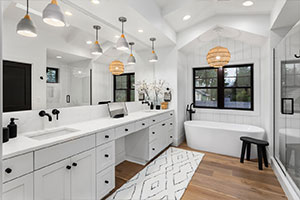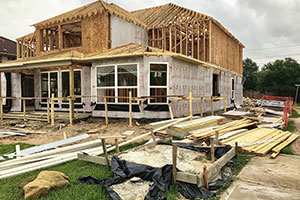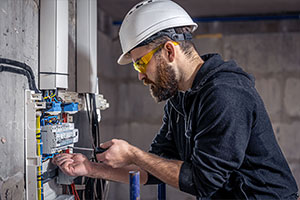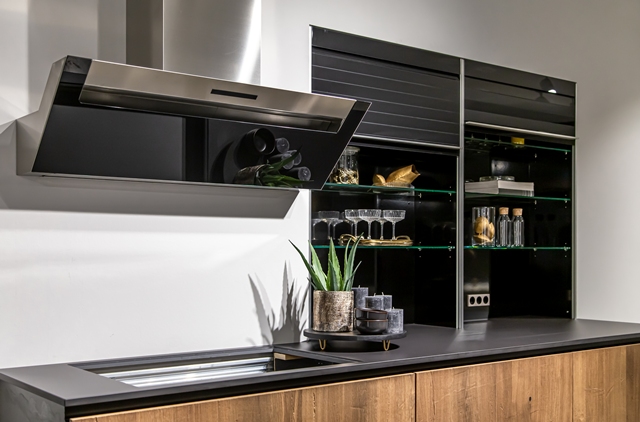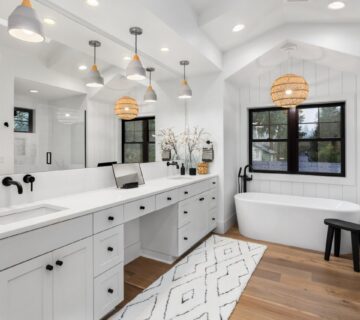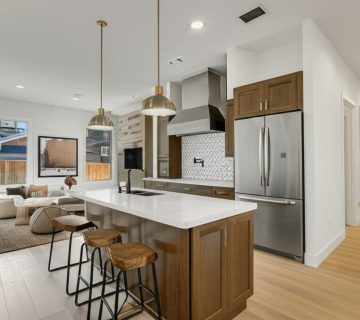Remodeling a kitchen is an exciting project that can transform the heart of your home. Before you start tearing down walls or putting in new cabinets, you might be asking, “Do I need a permit to remodel my kitchen?” The answer depends on several factors, including the scope of the remodel, the location of your home, and the specific changes you plan to make.
At OC Trust Remodeling in Coto De Caza, California, we focus on kitchen remodels. We help homeowners understand the often-confusing process of getting permits. In this blog post, we will talk about when you need permits for a kitchen remodel. We will also cover what types of work usually require a permit. Finally, we will explain how to ensure your remodel follows local rules.
Why Permits Are Important for Kitchen Remodeling
Permits help local governments make sure construction projects follow safety rules, building codes, and zoning laws. For a kitchen remodel, permits ensure that electrical, plumbing, and structural work is done properly and safely. The primary goal of a permit is to protect your home, your family, and the contractors working on your project.
Building codes and rules change based on the area. Not getting the right permits can cause expensive fines, delays, or problems when selling your home later. Whether you are planning a small renovation or a big change, knowing when and why you need a permit is important. This helps make sure your kitchen remodel is successful.
When Do You Need a Permit for a Kitchen Remodel?
Whether or not you need a permit for your kitchen remodel largely depends on the extent of the changes you plan to make. Here are some common kitchen remodeling tasks and whether or not a permit is usually required:
1. Changing the Layout or Structure of the Kitchen
If you plan to knock down walls, move windows or doors, or change your kitchen’s layout, you will likely need a permit. Structural changes require permits because they can affect the overall safety and integrity of your home.
For example, if you remove a load-bearing wall to make an open-concept kitchen, you need a permit. This ensures the new design follows local building codes and has the right support. In many cases, an engineer will need to sign off on the structural work.
2. Plumbing and Electrical Work
Any significant changes to plumbing or electrical systems usually require a permit. This includes adding or moving sinks, dishwashers, or gas lines, as well as installing new lighting or outlets. Plumbing and electrical work need to be performed by licensed professionals to meet safety codes.
In addition to the work itself, inspections are usually required to ensure that everything is installed properly and safely. If you plan to upgrade your kitchen’s plumbing or electrical systems, you will likely need permits. This includes installing a new refrigerator with an ice maker or adding a dedicated circuit for a new appliance.
3. Replacing Cabinets, Countertops, and Fixtures
In general, you usually do not need a permit to replace cosmetic items like cabinets, countertops, and light fixtures. This is true as long as you do not change the plumbing, electrical, or structural parts of the kitchen. If you change the layout or add new appliances that need plumbing or electrical work, you will need a permit.
It’s important to know that you may need a permit for your project. This is especially true if you are removing and replacing countertops that are connected to gas or plumbing. This applies to things like a kitchen island with a sink or stove.
4. Installing New Flooring
Replacing or installing new flooring, whether it’s hardwood, tile, or vinyl, typically does not require a permit. If you need to remove or replace bad subflooring, or if you are installing radiant heating, you may need permits.
If your remodel includes changes to the subfloor, like reinforcing or replacing it, check with your local building authority. You need to see if a permit is required.
5. Changing or Adding Windows and Doors
If you want to install new windows or doors in your kitchen, you might need a permit. This is especially true if you change the size or location of the openings. Changing or adding windows can impact the home’s structure, energy use, and safety. Because of this, a permit is often needed.
Local rules may have specific requirements for window size and placement. This is especially true in kitchens, where good ventilation and natural light are important. Permits are needed to make sure windows and doors follow safety rules. These rules include fire resistance and emergency escape routes.
6. HVAC System Modifications
If you are remodeling your kitchen, you may need a permit. This is especially true if you are changing your heating, ventilation, and air conditioning (HVAC) systems. HVAC work needs permits. This ensures that systems are installed safely and work well. It also makes sure they meet energy efficiency standards.
Changes to HVAC systems are very important in kitchen remodels. Good ventilation is key for safety and air quality. For example, if you’re adding a range hood or relocating ductwork, a permit will likely be required.
What Does the Permitting Process Involve?
If your kitchen remodel requires a permit, you’ll need to follow the steps outlined by your local government. Here’s a general overview of the permitting process:
- Talk to Experts: Before getting a permit, it’s important to work with licensed contractors, electricians, plumbers, and designers. They know local codes and rules. Experts will help you figure out which parts of the remodel need permits. They can also assist with the permit application process.
- Submit Your Permit Application: To get a permit, you must send an application to your local building department. The application will usually have detailed plans for the remodel. This includes architectural drawings, electrical diagrams, plumbing diagrams, and material specifications.
- Pay Fees: There are often fees associated with obtaining permits, which can vary based on the scope of the project. These fees typically cover the cost of inspections and administrative processing.
- Inspection Process: Once your remodel starts, building inspectors will come to your property. They will check that the work follows the approved plans and meets safety standards. If the work passes inspection, the permit will be closed out. If there are any issues, the inspector will provide you with a list of corrections that need to be made before proceeding.
- Final Approval: After the remodel is done, you will need a final inspection. This is to make sure everything meets local building codes. Once everything is approved, the permit is officially closed, and you can enjoy your newly remodeled kitchen.
What Happens if You Remodel Without a Permit?
In some cases, homeowners may be tempted to skip the permit process in an effort to save time or money. However, remodeling without a permit can lead to serious consequences, including:
- Fines and Penalties: If you remodel without a permit, you could face fines or penalties from the local government. These fines can be expensive and can add up quickly.
- Unsafe Work: Without proper inspections, there’s no guarantee that the work was done to code or is safe. For example, electrical or plumbing work that wasn’t inspected could pose a fire or water damage risk.
- Problems When Selling: If you decide to sell your home in the future, failing to obtain the proper permits can cause problems. Buyers might be unsure about buying a home with unpermitted work. Some lenders may not approve a mortgage for a home that has illegal changes. You may even be required to undo the remodel or bring it up to code.
- Insurance Issues: If your home is damaged because of unpermitted work, your insurance may not cover the damage. This could leave you responsible for the repair costs.
Conclusion
Remodeling a kitchen can be a great project. However, it’s important to know the permitting process before you start. The need for a permit depends on the scope of your remodel and the specific changes you plan to make. For major changes, you usually need permits. This includes structural work, plumbing, electrical work, and installing new windows or HVAC systems.
At OC Trust Remodeling in Coto De Caza, we are committed to helping homeowners navigate the complexities of kitchen remodels. Our team is experienced in working with local authorities to ensure that all necessary permits are obtained and that the project is compliant with building codes.
If you’re planning a kitchen remodel, don’t hesitate to contact us for expert advice and professional assistance. We’ll make sure your kitchen remodel is safe, legal, and completed to the highest standards.


